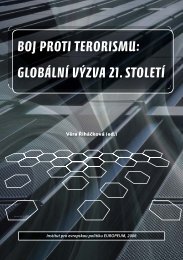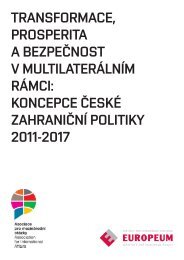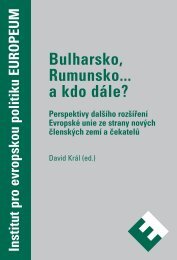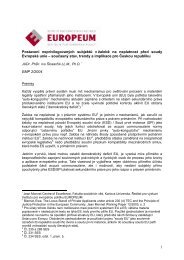eu constitutionalisation - EUROPEUM Institute for European Policy
eu constitutionalisation - EUROPEUM Institute for European Policy
eu constitutionalisation - EUROPEUM Institute for European Policy
You also want an ePaper? Increase the reach of your titles
YUMPU automatically turns print PDFs into web optimized ePapers that Google loves.
Chapter 7: Flexible Integration in the Common Foreign and Security <strong>Policy</strong>A second question refers to the aspect of conditional admissibility. It has to beclarified whether the legitimacy of cooperation outside the Treaties builds ona multi-level process. Following this assumption any objective of cooperationoutside the Treaties would require previous attempts to implement the matterwithin the framework of Union law. In case of failure the interesting memberstates would have to try to pursue their aim by using the mechanism ofenhanced cooperation. Solely if both initiatives remain unsuccessful it shouldbe possible to take recourse to cooperation outside the legal and institutionalframework of the Union. The legal foundation to bolster up this assumptionin the field of CFSP is to be found in Article 11 para 2 TEU:“The member states shall support the Union’s external andsecurity policy actively and unreservedly in a spirit of loyaltyand mutual solidarity. The member states shall work togetherto enhance and develop their mutual political solidarity. Theyshall refrain from any action which is contrary to the interests ofthe Union or likely to impair its effectiveness as a cohesive <strong>for</strong>cein international relations.”As noted above, Article 11 para 2 TEU exclusively bans harmful actionagainst the Union set by the member states but it does prohibit cooperationoutside the treaties. As a result one may not deduce any obligation to runthe different levels spelt out be<strong>for</strong>e. If at all, this would only be possibleby means of the stronger duty of faith in the realm of Community law(Article 10 TEC).⁶⁰CONCLUSIONSIn conclusion one may observe, that the measures of flexible integrationdiscussed above, contain promising elements towards a more functionalCFSP. However a balance has to be struck between the objective ofincreased efficiency and strengthened unity as well as between legal securityand necessary ad-hocism.60) Article 10 TEC states: „member states shall take all appropriate measures, whether general or particular,to ensure fulfilment of the obligations arising out of this Treaty or resulting from action taken bythe institutions of the Community. They shall facilitate the achievement of the Community’s tasks.They shall abstain from any measure which could jeopardise the attainment of the objectives of thisTreaty.”272Chapter 7: Flexible Integration in the Common Foreign and Security <strong>Policy</strong>The objective of enhancing efficiency has led to significant improvements.In other words, not only the restricted scope of implementation with regardto enhanced cooperation has been extended thereby overcoming the soleoption of constructive abstention, but it has been seriously contemplatedto additionally include institutionalised models of integration, designed <strong>for</strong>the shorter or longer term. Apart from a more positive connotation, thesetypes of cooperation offer the advantage to be directly adaptable to therespective needs and objectives.The requirement to comply with the principle of unity confronts us with thedilemma that the underpinning reason <strong>for</strong> the creation of these flexibilityinstruments is the persisting reality that often unity could not be reachedamong the member states. Likewise the extent of flexibility remainsa controversial issue as illustrated by the political resistance provoked bysome of the mechanisms proposed by the Convention. As a consequencemassive redrafting and substantial restrictions to the relevant provisionsoccurred during the IGC.The aspect of being institutionally anchored is decisive in view of the potentialimpact exercised by mechanisms of flexibility and the member statesconcerned. Only where the inherent link to the <strong>European</strong> Union remainsvisible, it is possible to attribute the relevant action to it. Moreover, inorder to meet the principle of consistency it is important to have a clear-cutdelimitation of competences. This is even more true since legal grounds<strong>for</strong> external action are spread over the fields of Community law as well asof CFSP/ESDP.However, mechanisms of flexibility in the realm of CFSP shall also allow<strong>for</strong> spontaneous reactions on important global questions in case thatno consistent answer could have been found in the Council. To thisend member states may avail themselves of the instrument of enhancedcooperation. In addition, in the more operative-military sphere of ESDPparticular mechanisms shall allow <strong>for</strong> rapid reaction. To this end the respectivenormative foundations have been left rather vague and does not evenclarify the degree of delegation of decision making competences nor theinterplay between the member states concerned and several crucial functionscurrently attributed to sub-organs such as the PSC or the Committeeof Contributors. This is particularly true with regard to future operationscarried out by ad-hoc groups of willing and able member states.273








